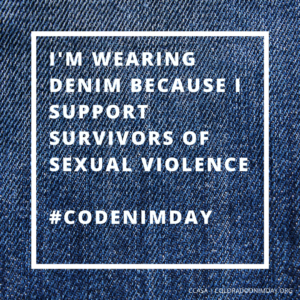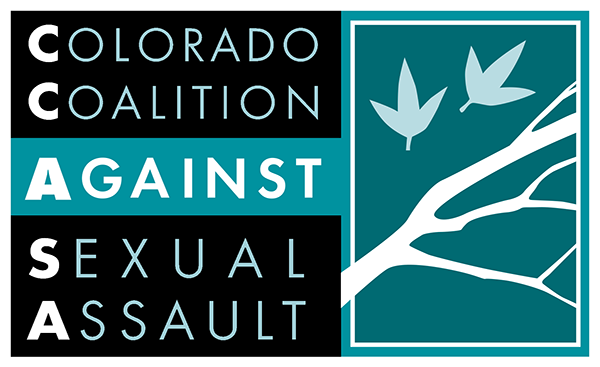 How to Show Support in Addition to Wearing Denim
How to Show Support in Addition to Wearing Denim
Written by Hailey Shea McMoore, CCASA Survivor Task Force
As a survivor of sexual assault, I love seeing allies wear denim on denim day. From denim pocket squares, to full coveralls, jean jackets and denim scrunchies, it is great to spend the day receiving visual cues from folks that they support survivors.
If you’re wearing denim on April 29, 2020 – thank you!
If you want to support survivors beyond wearing denim, here are some things allies have done for me (knowingly or unknowingly) that I’ve deeply appreciated:
Donate (as you can) to organizations that support survivors
Here are some of the Colorado organizations that have supported me:
Colorado Coalition Against Sexual Assault (CCASA)
Donations to CCASA create opportunities for me to move beyond survivor and into advocate. With the support of the CCASA staff I have shared my story publicly in a way to influence policy. It has been so empowering.
Sexual Assault Victims Advocacy Center (SAVA)
Without donations to create a sliding scale payment structure, I wouldn’t have been able to afford the liberating and life saving therapy I received from SAVA.
The Blue Bench
The case manager I was connected with at Blue Bench was funded by donors like you, and she helped me gain the courage and skills to report my assault to authorities.
Change your behavior/practices to be trauma-informed
Here are some things friends and allies have done that have helped me:
- Allow for flexible seating when able
- Allow for folks to take self-regulated breaks without shaming or drawing attention to them
- ALWAYS include trigger warnings – in conversation, e-mails, social media posts
- If you’re going to share something emotionally heavy, ask the person you’re speaking with if they are in a space where they can hear it
- Get consent before you touch someone (even if it’s just on the shoulder, even if you don’t think it’s a big deal)
Change your thinking
- Adopt a sex-positive ideology
- Practice empowering language
- STOP victim blaming
- Teach yourself, your friends, your family (especially your children) about consent

